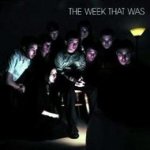
The Week That Was The Week That Was
(Memphis Industries)
Don't be misled, readers; the name may hint at satire, but the charms this album boasts are anything but comic. Field Music may have been a critical fixture in the middle part of the decade, but what's proven particularly interesting about them above and beyond their consistency of endearment has been what they've got up to on sabbatical. Here, for instance, Peter and David Brewis have cherry-picked from the Sunderland mafia (recruiting, among others, several members of This Ain't Vegas, as well as Pete "Johnny X / J Xaverre" Gofton, which should please the old Kenickie fans among you no end), leading to an all-too-familiar outcome in the world of offshootery; if School Of Language are this year's Sparta, then that makes The Week That Was an equivalent Mars Volta.
Not, mind you, that this approaches the ludicrousness of scale of The Bedlam In Goliath or its illustrious predecessors, although there's certain unlikely common ground. For one thing, while it might be adeptly restrained, there's a tremendous sense of the dramatic to the proceedings here, and it's established in an instant as Learn To Learn launches on a wave of cascading, concerned-sounding drums that draw on Making Plans for Nigel and, more closely still, Sat In Your Lap, and it sets out a template of unnerved randomness which the subsequent tracks explore thoroughly and unswervingly. It's not unmelodic by any stretch of the imagination - the Brewises' tuneful instincts are too keenly honed for that - but, structurally, it's courageously complex; to borrow a term from the time they're most evocative of, it's an album of difficult shapes and passive rhythms.
Moreover, it wears its influences very much on its sleeve without ever falling too heavily into hock with any of them. David has spoken of his admiration for Talk Talk, and the finest traits of their transitional heyday poke their heads above the parapets here with some regularity (the shattered glide from The Good Life to The Story Waits For No One, say, or the dark new pop stridency of recent single Scratch The Surface), and, while he may not have Mark Hollis' vocal dexterity, he gives a nuanced, colourful and warmly melancholy performance throughout. There are flashes, too, of Japan at their most rococo and detached, while the sweeping swell of classic Blue Nile (reinterpreted to wonderful and absurdly-overdue commercial effect by Elbow in recent years, which bodes especially well), not to mention their sharp sense of economy, permeates much of this affair as well.
And to return to the Volta parallels, this also happens to be a concept album. It's difficult to see entirely how it pans out under its original remit of being an imaginary crime thriller, but the collective have taken this starting point and used it to produce a series of snapshots of a life lived very much at a remove, careering catatonically through workplace automatism, the weary pursuit of purpose, and a general sense of displacement. Midpoint It's All Gone Quiet, a clattering, pseudo-oriental gasp for air, is a critical juncture, as it's the point of realisation that all the questioning that's gone before may not actually lead to any form of satisfaction, while the later epic Yesterday's Paper almost achieves some sort of acceptance, illustrated by insistent piano that combines stately stoicism with a sense of mundane conevyance that borders on the Kraftwerkian.
It's heady, bleak stuff, certainly, but the sheer ambition and, bizarrely, hint of liberation with which it's performed make it one of the year's most perplexingly life-affirming releases, and it's sheer smartness is capped by its closing with the instruction "get back to the beginning": this is an album unafraid of demanding ever more immersion from its audience. Field Music were a fine proposition, but this is an astonishing one, and we can but hope that, thanks to The Week That Was, the Brewises day has finally come...
23 November, 2008 - 12:00 — Iain Moffat